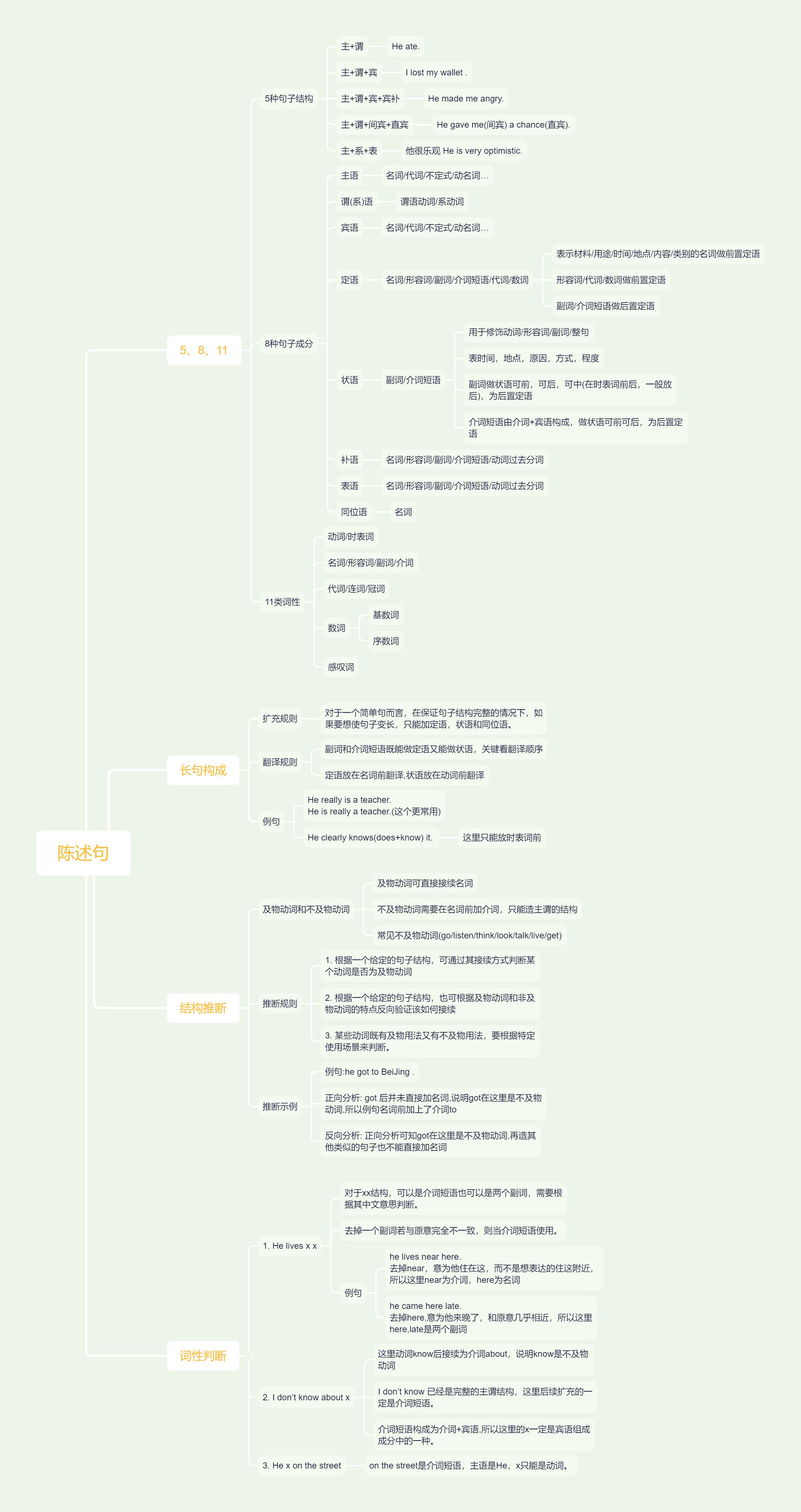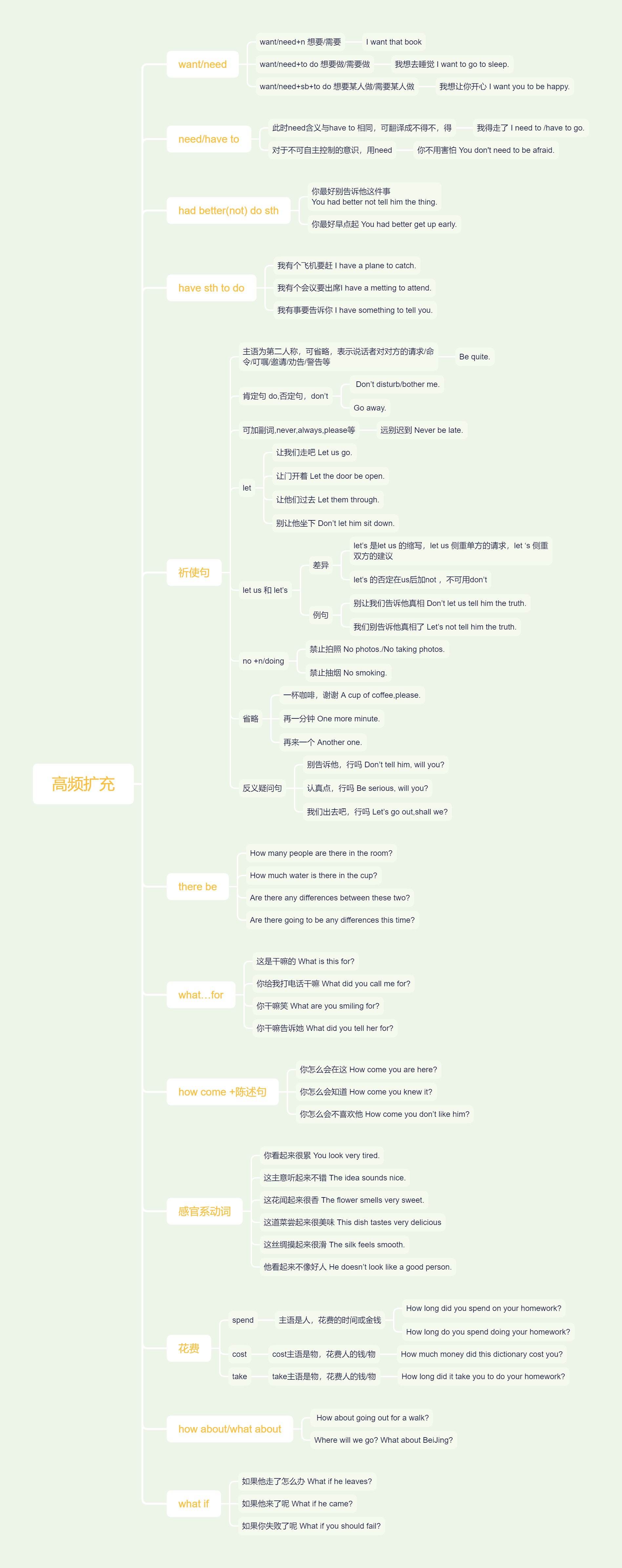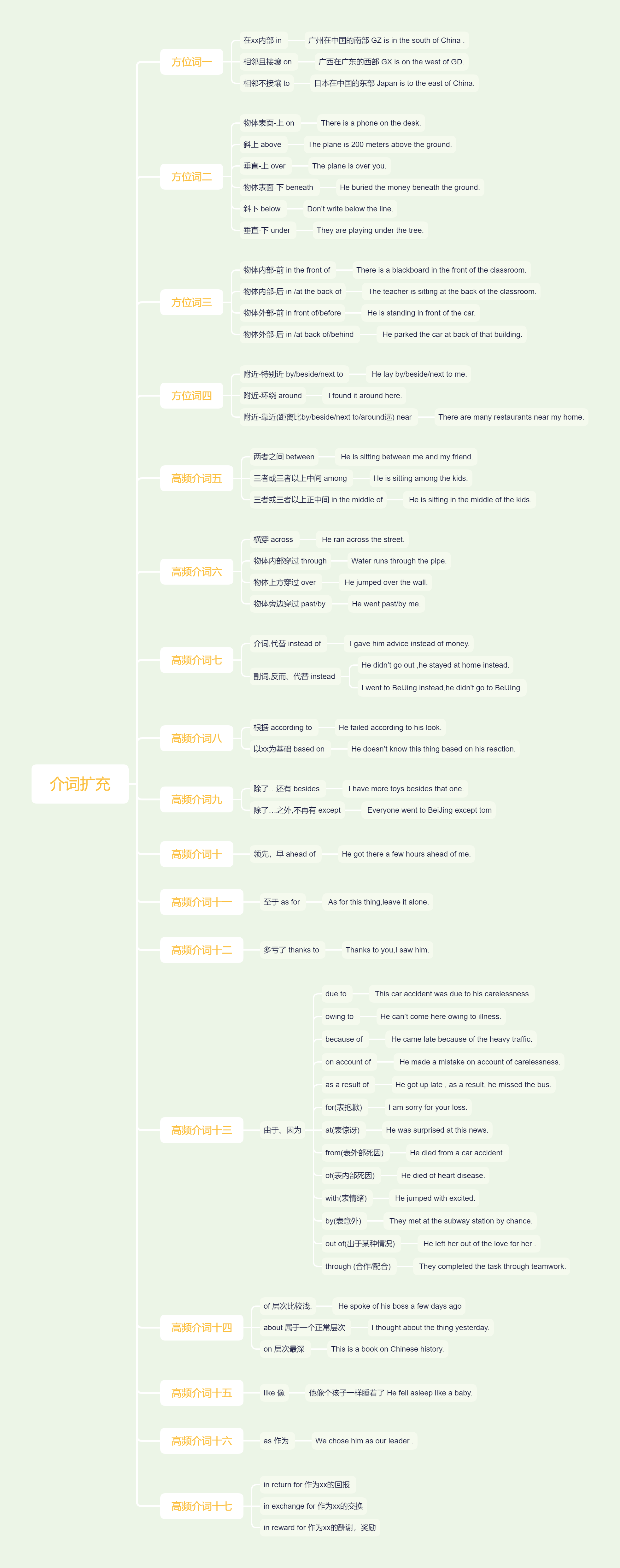5种句子结构
先判断是否有动词,有就是主谓(宾),没有就是主系表;时态和情态动词有哪个用哪个,没有谓语动词就用be动词。
主+谓 主+谓+宾 主+谓+宾+宾补 主+谓+间宾+直宾 主+系+表
8种句子成分
主语 谓语 宾语 定语 状语 补语 表语 同位语
11类词性
动词 时表词 名词 形容词 副词 介词 代词 连词 冠词 数词(基数词/序数词) 感叹词
句子成分与词性的组合
| 主语 | 名词/代词/不定式/动名词... |
| 谓(系)语 | 谓语动词/系动词 |
| 宾语 | 名词/代词/不定式/动名词... |
| 定语 | 名词/形容词/副词/介词短语/代词/数词 |
| 状语 | 副词/介词短语... |
| 补语 | 名词/形容词/副词/介词短语/动词过去分词 |
| 表语 | 名词/形容词/副词/介词短语/动词过去分词 |
| 同位语 | 名词 |
定语补充
表示材料/用途/时间/地点/内容/类别的名词可做前置定语 形容词/代词/数词可做前置定语 副词/介词短语可做后置定语
状语补充
状语用于修饰动词/形容词/副词/整句 表时间,地点,原因,方式,程度
副词/介词短语
副词做状语可前,可后,可中(在时表词前后,一般放后),做后置定语 介词短语由介词+宾语构成,做状语可前可后,做后置定语
长句构成
对于一个简单句而言,在保证句子结构完整的情况下,如果要想使句子变长,只能加定语,状语和同位语。
副词和介词短语既能做定语又能做状语,关键看翻译顺序 定语放在名词前翻译,状语放在动词前翻译 原句: a boy bought a car
加入定语: A young boy at school bought his first second-hand sports car.
加入定语和状语:A young boy at school excitedly bought his first second-hand sports car with his parents in the afternoon last week at 4s shop with quite a lot of money.
例句
He even didn't tell me. <=> He didn't even tell me.(这个更常用) He really is a teacher. <=> He is really a teacher.(这个更常用) He clearly knows it. 这里只能放时表词前,does+know=knows He quickly got into the room. 这里只能放时表词前,did+get=got
结构推断
根据一个给定的句子结构,可通过其接续方式判断某个动词是否为及物动词,也可根据及物动词和非及物动词的特点反向验证该如何接续。值得注意的是,某些动词既有及物用法又有不及物用法,要根据特定使用场景来判断。
及物动词和不及物动词
及物动词可直接接续名词 不及物动词需要在名词前加介词,只能造主谓的结构 常见不及物动词(go/listen/think/look/talk/live/get)
go home/ go to home
首先,这两种方式都是对的,只是表达的角度不同 go home, go作为不及物动词,home作为副词,是副词修饰动词的结构 go to home, go 依旧是不及物动词,但是home作名词使用,所以接续需要名词前加介词to
例句:he got to BeiJing . 正向分析: got 后并未直接加名词,说明got在这里是不及物动词,所以例句名词前加上了介词to 反向分析: 正向分析可知got在这里是不及物动词,再造其他类似的句子也不能直接加名词
he went abroad
went为不及物动词,he went 已经构成完整的主谓结构 句子结构完整情况下,扩充只能加入定语,状语,同位语,加入介词短语或副词情况居多 介词短语由介词+宾语构成,此处也明显不是同位语,故abroad是副词
I saw him abroad. 修饰动词saw,我在国外见过他 He is abroad. 主系表结构,表语可以是名词/形容词/副词/介词短语/动词过去分词
词性判断
通过对句子结构进行推断可以更清晰的确定词性,灵活运用
1. He lives x x
下边的例句有些代表性,对于xx结构,可以是介词短语也可以是两个副词,需要根据其中文意思判断。去掉一个副词若与原意完全不一致,则作为介词短语使用。
he lives near here. 去掉near,意为他住在这,而不是想表达的住这附近,所以这里near为介词,here为名词 he came here late. 去掉here,意为他来晚了,和原意几乎相近,所以这里here,late是两个副词
2. I don't know about x
这里动词know后接续为介词about,说明know是不及物动词 I don't know 已经是完整的主谓结构,这里后续扩充的一定是介词短语。 介词短语构成为介词+宾语,所以这里的x一定是宾语组成成分中的一种。
3. He x on the street
on the street是介词短语,主语是He,x只能是动词。
4. I left BeiJing x him
I left BeiJing是完整的主谓宾结构,这里扩充的话x只能是介词
主谓(宾)
我吃了 I ate. 我去了北京 I went to BeiJing. 他认识他 He knows him. 他要来北京 He is going to come to BeiJing. 我会回来的 I will come back. 他们在看电视 They are watching TV. 他已经吃过了 He has eaten.
主系表
我昨天没在家 I was not at home yesterday. 你会是一个好爸爸的 You will be a good father. 地铁正在被建 The subway is being built. 他已经当了3年的老师了 He has been a teacher for 3 years. 我明天会在北京的 I will be in BeiJing tomorrow. 这件事很快会被解决的 This thing will be solved soon. 他很乐观 He is very optimistic. 我当时很尴尬 I was very embarrassed. 手机在桌子上 The phone is on the desk. 那条河很长 That river is very long.
主谓间宾+直宾
他给了我一次机会 He gave me(间宾) a chance(直宾). 他给我讲了个故事 He told me a story. 他借给了我100块钱 He lent me 100 yuan. 他给我写了一封信 He wrote me a letter . 他给我发了张照片 He sent me a picture . 他给我们带了些吃的 He brought us something to eat. 他给我提供了一份工作 He offered me a job . 他给我读了一篇文章 He read me an article . 他给我看了他的新车 He showed me his new car. 他给我看了他的票 He showed me his ticket.
主谓宾+宾补
宾补用于对宾语的情况进行补充说明,宾+宾补可以构成主系表结构。
他把房间涂成了蓝色 He painted the room blue. 他把所有东西都准备好了 He got everything ready. 我希望你健康 I wish you healthy. 你要把我逼疯了 You are driving me crazy. 我发现英语很困难 I found English difficult. 他发现房子很脏 He found the house dirty. 我发现这本书很有趣 I found the book interesting. 他让我生气 He made me angry. 他让这问题变得更困难了 He made the problem harder. 你使我们成为了一家人 You made us a family.
高频扩充
对生活中常用的词汇词组句型进行扩充
want/need
want/need+n 想要/需要 我想要那本书 I want that book. want/need+to do 想要做/需要做 我想去睡觉 I want to go to sleep. want/need+sb+to do 想要某人做/需要某人做 我想让你开心 I want you to be happy.
need/have to
此时need含义与have to 相同,可翻译成不得不、得 我得走了 I need to /have to go. 对于不可自主控制的意识,用need 你不用害怕 You don't need to be afraid.
had better(not) do sth
最好(不)做某事
你最好别告诉他这件事 You had better not tell him the thing. 你最好早点起 You had better get up early.
have sth to do
有某事要去做
我有个飞机要赶 I have a plane to catch. 我有个会议要出席I have a metting to attend. 我有事要告诉你 I have something to tell you.
祈使句
主语为第二人称,可省略,表示说话者对对方的请求/命令/叮嘱/邀请/劝告/警告等 肯定句 do,否定句,don't 可加副词,never,always,please等
走开 Go away. 安静点 Be quite. 别打扰我 Don't disturb/bother me. 远别迟到 Never be late.
let
让我们走吧 Let us go. 让门开着 Let the door be open. 让他们过去 Let them through. 别让他坐下 Don't let him sit down.
let us 和 let's
let's 是let us 的缩写,但表达有差异,let us 侧重单方的请求,let 's 侧重双方的建议 let's 的否定在us后加not ,不可用don't
别让我们告诉他真相 Don't let us tell him the truth. 我们别告诉他真相了 Let's not tell him the truth. 别让我们做作业了 Don't let us do the homework 让我们别做作业了 Let's not do the homework.
no +n/doing
禁止拍照 No photos./No taking photos. 禁止抽烟 No smoking.
省略
一杯咖啡,谢谢 A cup of coffee,please. 再一分钟 One more minute. 再来一个 Another one.
反义疑问句
别告诉他,行吗 Don't tell him, will you? 认真点,行吗 Be serious, will you? 我们出去吧,行吗 Let's go out,shall we?
there be +名词 主系表
屋里有多少人 How many people are there in the room? 杯子里有多少水 How much water is there in the cup? 这两者之间有不同吗 Are there any differences between these two? 这次会有不同吗 Are there going to be any differences this time?
what...for,类似why
这是干嘛的 What is this for? 你给我打电话干嘛 What did you call me for? 你干嘛笑 What are you smiling for? 你干嘛告诉她 What did you tell her for?
how come +陈述句
怎么会出现某种情况
你怎么会在这 How come you are here?/How are you here? 你怎么会知道 How come you knew it? 你怎么会不喜欢他 How come you don't like him?
look,sound,smell,taste,feel+adj/+like +n
你看起来很累 You look very tired. 这主意听起来不错 The idea sounds nice. 这花闻起来很香 The flower smells very sweet. 这道菜尝起来很美味 This dish tastes very delicious 这丝绸摸起来很滑 The silk feels smooth. 他看起来不像好人 He doesn't look like a good person.
花费
spend 主语是人,花费的时间或金钱/cost/take主语是物,花费人的钱/物 spend time/money+ (in) doing /on sth/with sb it take (sb) time to do sth n +cost sb money /it +cost sb money to do sth
你花了多长时间在你的作业上 How long did you spend on your homework? 你一般都花多长时间做作业 How long do you spend doing your homework? 做作业花了你多久 How long did it take you to do your homework? 这本字典花了你多少钱 How much money did this dictionary cost you?
how about/what about
提出建议或请求
出去走走怎么样 How about going out for a walk? 我们去哪啊?北京怎么样 Where will we go? What about BeiJing?
what if
表假设:如果...怎么办 ,接续一般现在时或虚拟
如果他走了怎么办 What if he leaves? 一般现在时 如果他来了呢 What if he came? 虚拟
高频介词
| 在xx内部 | in | 广州在中国的南部 GZ is in the south of China . |
| 相邻且接壤 | on | 广西在广东的西部 GX is on the west of GD. |
| 相邻不接壤 | to | 日本在中国的东部 Japan is to the east of China. |
| 垂直-上 | over | 飞机在你正上方 The plane is over you. |
| 垂直-下 | under | 他们正在树下玩 They are playing under the tree. |
| 斜上 | above | 飞机在地面高空200米处 The plane is 200 meters above the ground. |
| 斜下 | below | 别写到线下面去了 Don't write below the line. |
| 物体表面-上 | on | 桌上有一部手机 There is a phone on the desk. |
| 物体表面-下 | beneath | 他把钱埋在了地下 He buried the money beneath the ground. |
| 物体内部-前 | in the front of | 教室前面有块黑板 There is a blackboard in the front of the classroom. |
| 物体内部-后 | in /at the back of | 老师坐在教室的后面 The teacher is sitting at the back of the classroom. |
| 物体外部-前 | in front of/before | 他站在车前 He is standing in front of the car. |
| 物体外部-后 | in /at back of/behind | 他把车停在了那栋楼后面 He parked the car at back of that building. |
| 附近-特别近 | by/beside/next to | 他在我旁边躺下了 He lay by/beside/next to me. |
| 附近-环绕 | around | 我就是在这附近找到的它 I found it around here. |
| 附近-靠近(距离比by/beside/next to/around远) | near | 我家附近有很多餐馆 There are many restaurants near my home. |
| 两者之间 | between | 他坐在我和我朋友中间 He is sitting between me and my friend. |
| 三者或三者以上中间 | among | 他坐在孩子们中间 He is sitting among the kids. |
| 三者或三者以上正中间 | in the middle of | 他坐在孩子们正中间 He is sitting in the middle of the kids. |
| 横穿 | across | 他跑到了马路对面 He ran across the street. |
| 物体内部穿过 | through | 水从这管子流过 Water runs through the pipe. |
| 物体上方穿过 | over | 他跳过了这堵墙 He jumped over the wall. |
| 物体旁边穿过 | past/by | 他从我身旁经过 He went past/by me. |
| 介词,代替 | instead of | 我没给他钱而是给了他建议 I gave him advice instead of money. |
| 副词,反而,替代 | instead | 他没出门而是待在了家 He didn't go out ,he stayed at home instead. |
| 根据 | according to | 根据他的表情来看,他失败了 He failed according to his look. |
| 以xx为基础 | based on | 从他的反应来看,他不知道这件事 He doesn't know this thing based on his reaction. |
| 除了...还有 | besides | 除了那个,我还有更多的玩具 I have more toys besides that one. |
| 除了...之外,不再有 | except | 除了Tom,所有人都去了北京 Everyone went to BeiJing except tom. |
领先,早 ahead of 他比我早几个小时到的那 He got there a few hours ahead of me.
至于 as for 至于这件事,你就不用管了 As for this thing,leave it alone.
多亏了 thanks to 多亏了你,我才能见到他 Thanks to you,I saw him.
由于,因为 :
due to 这场车祸是由他的粗心造成的 This car accident was due to his carelessness. owing to 他因病不能来 He can't come here owing to illness. because of 由于堵塞的交通,他来晚了 He came late because of the heavy traffic. on account of 他由于马虎犯了错 He made a mistake on account of carelessness. as a result of 他起晚了,结果错过了公交。 He got up late , as a result, he missed the bus. for(表抱歉) 对于你的损失,我感到抱歉 I am sorry for your loss. at(表惊讶) 听到这个消息他很惊讶 He was surprised at this news. from(表外部死因) 他死于车祸 He died from a car accident. of(表内部死因) 他死于心脏病 He died of heart disease. with(表情绪) 他激动地跳了起 He jumped with excited. by(表意外) 他们在地铁站偶然相遇了 They met at the subway station by chance. out of(出于某种情况) 他出于对她的爱离开了她 He left her out of the love for her . through (合作/配合) 他们完成任务是由于团队合作 They completed the task through teamwork.
of about on 表关于:
of 层次比较浅 He spoke of his boss a few days ago. about 属于一个正常层次 I thought about the thing yesterday. on 层次最深 This is a book on Chinese history.
like 喜欢/像 他像个孩子一样睡着了 He fell asleep like a baby.
as 作为 We chose him as our leader .
in return for 作为xx的回报 作为帮我的报答,我告诉了他真相 I told him the truth in return for his help.
in exchange for 作为xx的交换
in reward for 作为xx的酬谢,奖励
往东走200米You go east(副词用法) for 200 meters.
往东走200米You go to the east (名词用法) for 200 meters.
省略
- 一杯咖啡,谢谢 A cup of coffee,please.
- 再一分钟 One more minute.
- 再来一个 Another one.
反义疑问句
- 别告诉他,行吗 Don’t tell him, will you?
- 认真点,行吗 Be serious, will you?
- 我们出去吧,行吗 Let’s go out,shall we?
there be +名词 主系表
- 屋里有多少人 How many people are there in the room?
- 杯子里有多少水 How much water is there in the cup?
- 这两者之间有不同吗 Are there any differences between these two?
- 这次会有不同吗 Are there going to be any differences this time?
what…for,类似why
- 这是干嘛的 What is this for?
- 你给我打电话干嘛 What did you call me for?
- 你干嘛笑 What are you smiling for?
- 你干嘛告诉她 What did you tell her for?
how come +陈述句
- 怎么会出现某种情况
- 你怎么会在这 How come you are here?/How are you here?
- 你怎么会知道 How come you knew it?
- 你怎么会不喜欢他 How come you don’t like him?
look,sound,smell,taste,feel+adj/+like +n
- 你看起来很累 You look very tired.
- 这主意听起来不错 The idea sounds nice.
- 这花闻起来很香 The flower smells very sweet.
- 这道菜尝起来很美味 This dish tastes very delicious
- 这丝绸摸起来很滑 The silk feels smooth.
- 他看起来不像好人 He doesn’t look like a good person.
花费
- spend 主语是人,花费的时间或金钱/cost/take主语是物,花费人的钱/物
- spend time/money+ (in) doing /on sth/with sb
- it take (sb) time to do sth
- n +cost sb money /it +cost sb money to do sth
- 你花了多长时间在你的作业上 How long did you spend on your homework?
- 你一般都花多长时间做作业 How long do you spend doing your homework?
- 做作业花了你多久 How long did it take you to do your homework?
- 这本字典花了你多少钱 How much money did this dictionary cost you?
how about/what about
- 提出建议或请求
- 出去走走怎么样 How about going out for a walk?
- 我们去哪啊?北京怎么样 Where will we go? What about BeiJing?
what if
- 表假设:如果…怎么办 ,接续一般现在时或虚拟
- 如果他走了怎么办 What if he leaves? 一般现在时
- 如果他来了呢 What if he came? 虚拟
高频介词
| 在xx内部 | in | 广州在中国的南部 GZ is in the south of China . |
| 相邻且接壤 | on | 广西在广东的西部 GX is on the west of GD. |
| 相邻不接壤 | to | 日本在中国的东部 Japan is to the east of China. |
| 垂直-上 | over | 飞机在你正上方 The plane is over you. |
| 垂直-下 | under | 他们正在树下玩 They are playing under the tree. |
| 斜上 | above | 飞机在地面高空200米处 The plane is 200 meters above the ground. |
| 斜下 | below | 别写到线下面去了 Don’t write below the line. |
| 物体表面-上 | on | 桌上有一部手机 There is a phone on the desk. |
| 物体表面-下 | beneath | 他把钱埋在了地下 He buried the money beneath the ground. |
| 物体内部-前 | in the front of | 教室前面有块黑板 There is a blackboard in the front of the classroom. |
| 物体内部-后 | in /at the back of | 老师坐在教室的后面 The teacher is sitting at the back of the classroom. |
| 物体外部-前 | in front of/before | 他站在车前 He is standing in front of the car. |
| 物体外部-后 | in /at back of/behind | 他把车停在了那栋楼后面 He parked the car at back of that building. |
| 附近-特别近 | by/beside/next to | 他在我旁边躺下了 He lay by/beside/next to me. |
| 附近-环绕 | around | 我就是在这附近找到的它 I found it around here. |
| 附近-靠近(距离比by/beside/next to/around远) | near | 我家附近有很多餐馆 There are many restaurants near my home. |
| 两者之间 | between | 他坐在我和我朋友中间 He is sitting between me and my friend. |
| 三者或三者以上中间 | among | 他坐在孩子们中间 He is sitting among the kids. |
| 三者或三者以上正中间 | in the middle of | 他坐在孩子们正中间 He is sitting in the middle of the kids. |
| 横穿 | across | 他跑到了马路对面 He ran across the street. |
| 物体内部穿过 | through | 水从这管子流过 Water runs through the pipe. |
| 物体上方穿过 | over | 他跳过了这堵墙 He jumped over the wall. |
| 物体旁边穿过 | past/by | 他从我身旁经过 He went past/by me. |
| 介词,代替 | instead of | 我没给他钱而是给了他建议 I gave him advice instead of money. |
| 副词,反而,替代 | instead | 他没出门而是待在了家 He didn’t go out ,he stayed at home instead. |
| 根据 | according to | 根据他的表情来看,他失败了 He failed according to his look. |
| 以xx为基础 | based on | 从他的反应来看,他不知道这件事 He doesn’t know this thing based on his reaction. |
| 除了…还有 | besides | 除了那个,我还有更多的玩具 I have more toys besides that one. |
| 除了…之外,不再有 | except | 除了Tom,所有人都去了北京 Everyone went to BeiJing except tom. |
领先,早 ahead of 他比我早几个小时到的那 He got there a few hours ahead of me.
至于 as for 至于这件事,你就不用管了 As for this thing,leave it alone.
多亏了 thanks to 多亏了你,我才能见到他 Thanks to you,I saw him.
由于,因为 :
- due to 这场车祸是由他的粗心造成的 This car accident was due to his carelessness.
- owing to 他因病不能来 He can’t come here owing to illness.
- because of 由于堵塞的交通,他来晚了 He came late because of the heavy traffic.
- on account of 他由于马虎犯了错 He made a mistake on account of carelessness.
- as a result of 他起晚了,结果错过了公交。 He got up late , as a result, he missed the bus.
- for(表抱歉) 对于你的损失,我感到抱歉 I am sorry for your loss.
- at(表惊讶) 听到这个消息他很惊讶 He was surprised at this news.
- from(表外部死因) 他死于车祸 He died from a car accident.
- of(表内部死因) 他死于心脏病 He died of heart disease.
- with(表情绪) 他激动地跳了起 He jumped with excited.
- by(表意外) 他们在地铁站偶然相遇了 They met at the subway station by chance.
- out of(出于某种情况) 他出于对她的爱离开了她 He left her out of the love for her .
- through (合作/配合) 他们完成任务是由于团队合作 They completed the task through teamwork.
of about on 表关于:
- of 层次比较浅 He spoke of his boss a few days ago.
- about 属于一个正常层次 I thought about the thing yesterday.
- on 层次最深 This is a book on Chinese history.
like 喜欢/像 他像个孩子一样睡着了 He fell asleep like a baby.
as 作为 We chose him as our leader .
in return for 作为xx的回报 作为帮我的报答,我告诉了他真相 I told him the truth in return for his help.
in exchange for 作为xx的交换
in reward for 作为xx的酬谢,奖励
往东走200米You go east(副词用法) for 200 meters.
往东走200米You go to the east (名词用法) for 200 meters.
–>
思维导图





